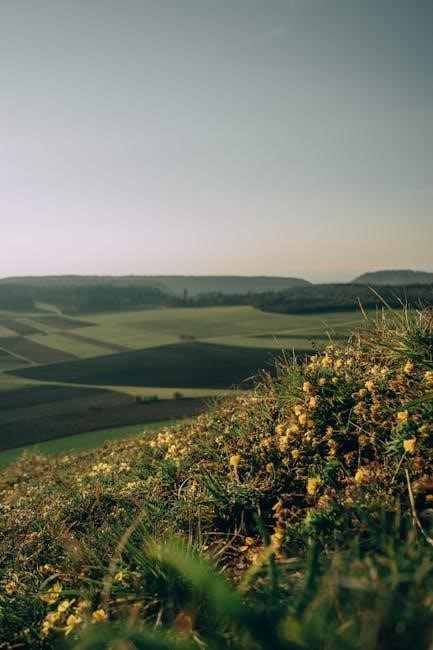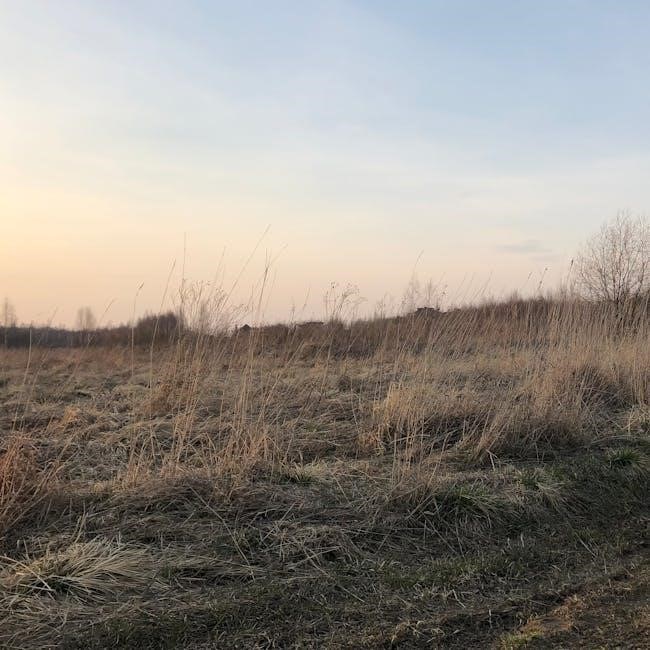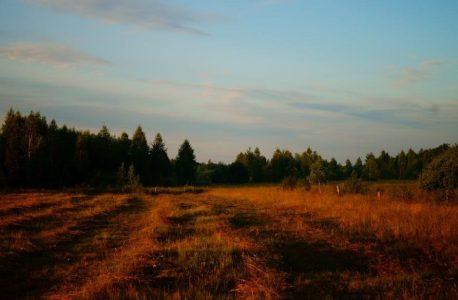The Land of Open Graves by Jason De León is a gripping ethnography exposing the brutal realities of undocumented migration across the US-Mexico border.
Through archaeology‚ forensic science‚ and personal narratives‚ De León reveals the human cost of immigration policies in the Sonoran Desert‚ offering a powerful critique of border violence and its impact on migrants’ lives.
Available as a PDF‚ this book is a vital resource for understanding the intersection of politics‚ humanity‚ and survival in one of the world’s most dangerous migration routes.
Overview of the Book and Its Author
The Land of Open Graves is a seminal work by anthropologist Jason De León‚ a MacArthur “Genius” Fellow‚ that examines the harrowing experiences of undocumented migrants crossing the US-Mexico border. Drawing on six years of ethnographic‚ archaeological‚ and forensic research‚ De León provides a vivid account of the Sonoran Desert’s deadly terrain and the human cost of migration. The book‚ which includes haunting photographs by Michael Wells‚ critiques US immigration policies and their devastating consequences. De León’s interdisciplinary approach blends storytelling with scientific analysis‚ offering a deeply personal and academic exploration of one of the most pressing issues of our time. The book is widely available in PDF format.
The Central Theme of Undocumented Migration
The Land of Open Graves delves into the perilous journey of undocumented migrants attempting to cross the US-Mexico border‚ focusing on the Sonoran Desert as a lethal passage. The book underscores the humanitarian crisis fueled by restrictive immigration policies and the treacherous natural environment. Through personal narratives and forensic data‚ it reveals the suffering‚ death‚ and resilience of migrants. The central theme highlights the dehumanizing effects of border enforcement and the moral imperative to address this crisis. Available as a PDF‚ the book serves as a critical examination of migration’s human cost and its broader societal implications.
The Role of the Sonoran Desert in the Narrative
The Sonoran Desert plays a central role in The Land of Open Graves‚ serving as both a setting and a symbol of the deadly challenges migrants face. Its harsh environment—extreme temperatures‚ arid landscapes‚ and scarce water—makes it a lethal obstacle for those attempting to cross into the United States. The desert’s rugged terrain and remoteness also obscure the scale of suffering‚ with many deaths going unreported. Through vivid descriptions and forensic analysis‚ the book highlights how the desert becomes a graveyard for countless migrants‚ underscoring the human cost of border policies and the invisible violence of environmental factors. Available as a PDF‚ the narrative exposes the desert’s dual role as a natural barrier and a witness to tragedy.

The Context of Undocumented Migration
The Land of Open Graves examines the historical and political roots of undocumented migration‚ highlighting the dangers migrants face and the policies driving these perilous journeys. Available as a PDF‚ it provides a critical analysis of border dynamics and their human toll.
Historical Background of US-Mexico Border Crossings
The Land of Open Graves traces the historical roots of US-Mexico border crossings‚ highlighting how policies like Operation Gatekeeper transformed the border into a deadly obstacle. De León’s research reveals how increased enforcement pushed migrants into perilous desert regions‚ escalating deaths. The book examines the shift from relatively open borders to militarized zones‚ emphasizing the human cost of these changes. By combining archival data with personal stories‚ De León exposes the violent legacy of border control policies and their devastating impact on migrants. This historical context underscores the book’s critique of immigration policies as a root cause of suffering in the Sonoran Desert.
The Dangers Faced by Migrants in the Desert
The Land of Open Graves vividly documents the life-threatening challenges migrants face in the Sonoran Desert‚ including extreme temperatures‚ dehydration‚ and exposure. De León highlights how the desert becomes a graveyard for many‚ with bodies often left unidentified. The book reveals how US border policies‚ such as Operation Gatekeeper‚ funneled migrants into the most dangerous regions‚ exacerbating deaths. Through forensic science and personal narratives‚ De León exposes the brutal conditions migrants endure‚ from treacherous terrain to predatory violence. These dangers underscore the humanitarian crisis at the core of undocumented migration‚ offering a haunting portrait of survival and loss in one of the world’s most unforgiving landscapes.
Political and Social Factors Driving Migration
The Land of Open Graves examines the political and social forces compelling migrants to undertake perilous journeys across the Sonoran Desert. Economic hardship‚ political instability‚ and violence in home countries drive individuals to seek better lives. Social factors‚ such as family reunification and escaping persecution‚ further fuel migration. The book highlights how U.S. policies‚ like Operation Gatekeeper‚ have funneled migrants into dangerous desert regions‚ increasing mortality rates. De León’s interdisciplinary approach reveals how these factors intersect‚ creating a dire humanitarian crisis. By exploring these dynamics‚ the book provides a nuanced understanding of the complexities behind undocumented migration and its devastating consequences.
Interdisciplinary Approach in the Book
The Land of Open Graves combines ethnography‚ archaeology‚ forensic science‚ and photography to provide a comprehensive analysis of undocumented migration‚ blending rigorous research with compelling storytelling.
Ethnographic Research Methods
In The Land of Open Graves‚ Jason De León employs ethnographic research to uncover the lived experiences of migrants crossing the Sonoran Desert.
Through participant observation‚ interviews‚ and long-term fieldwork‚ De León captures the harrowing realities of migration‚ providing a humanized narrative often overlooked in political discourse.
His approach emphasizes the voices of migrants‚ blending their stories with material evidence to create a holistic understanding of the border crossing experience.
This methodological rigor ensures a deeply empathetic and insightful portrayal of the challenges faced by undocumented travelers in one of the world’s most dangerous migration routes.
The Use of Archaeology in Studying Migration
In The Land of Open Graves‚ archaeology plays a crucial role in documenting the material remains of migration‚ such as discarded water bottles‚ clothing‚ and other personal items.
These artifacts‚ often overlooked‚ reveal the intimate stories of migrants and their journeys‚ offering a tangible connection to their experiences.
By analyzing these remnants‚ De León critiques the dehumanizing narratives surrounding migration‚ instead framing migrants as individuals with histories and aspirations.
Archaeology thus becomes a powerful tool to humanize the migrant experience and challenge the erasure of their stories in the desert landscape.
Forensic Science and Its Role in the Narrative
Forensic science in The Land of Open Graves provides a critical methodology for analyzing the remains and personal items of migrants in the Sonoran Desert.
By examining artifacts like clothing‚ water bottles‚ and human remains‚ De León reconstructs the stories of those who perished‚ offering a scientific lens to understand the harsh realities of migration.
Forensic techniques not only aid in identifying remains but also highlight the broader systemic issues contributing to migrant deaths‚ creating a poignant bridge between science and storytelling.
This approach underscores the human cost of border policies and advocates for accountability‚ making forensic science a vital component of the book’s narrative.
Photography as a Tool for Documentation
Photography in The Land of Open Graves serves as a powerful tool for documenting the harrowing experiences of migrants in the Sonoran Desert.
Michael Wells’ haunting images capture the remnants of migrants’ journeys‚ from discarded belongings to the harsh landscapes they traverse.
These photographs humanize the statistics‚ offering a visual testament to the suffering and resilience of those attempting to cross the border.
By juxtaposing the beauty of the desert with the grim reality of migration‚ the images underscore the emotional and physical toll faced by migrants.
Photography thus becomes an essential medium for storytelling‚ amplifying the book’s critique of border policies and advocating for a more compassionate understanding of migration.

The Human Cost of Migration
The Land of Open Graves exposes the harrowing human toll of undocumented migration‚ detailing stories of suffering‚ death‚ and survival in the Sonoran Desert.
The book vividly portrays the emotional and psychological impact on migrants‚ offering a poignant reminder of the lives lost and families shattered by border crossings.
Stories of Suffering and Survival
The Land of Open Graves vividly portrays the harrowing experiences of migrants crossing the Sonoran Desert‚ highlighting tales of resilience and tragedy.
Through personal narratives‚ the book reveals the immense physical and emotional hardships faced by individuals‚ including dehydration‚ exposure‚ and the constant threat of violence.
These stories humanize the statistics‚ offering a poignant glimpse into the lives of those driven by hope and desperation‚ while also exposing the brutal consequences of border policies.
De León’s work underscores the moral urgency of understanding migration as a deeply human issue‚ rather than a political abstraction‚ urging readers to confront the realities behind the headlines.
Death and Mourning in the Desert
The Land of Open Graves poignantly captures the devastating reality of death in the Sonoran Desert‚ where thousands of migrants perish annually due to extreme conditions.
Jason De León’s work highlights the forensic and archaeological efforts to identify remains‚ often found in remote areas‚ left unmarked and unnoticed by the world.
The book reveals the heartbreaking stories of families searching for loved ones‚ their grief compounded by the inability to bury them with dignity.
These tragic incidents underscore the human cost of border policies and the desert’s role as a graveyard for those seeking a better life.
The Emotional and Psychological Toll on Migrants
Migrants crossing the Sonoran Desert face immense emotional and psychological strain‚ exacerbated by the harsh environment and uncertain journey.
The constant fear of death‚ dehydration‚ and violence weighs heavily on their minds‚ leading to anxiety‚ despair‚ and long-term psychological trauma.
Jason De León’s work highlights how the perilous journey leaves lasting scars‚ with many survivors experiencing PTSD and survivor’s guilt.
The emotional toll is further intensified by the migrants’ separation from families and the loss of loved ones‚ creating a cycle of grief and resilience.

Critique of US Immigration Policies
The Land of Open Graves critiques US immigration policies‚ revealing how enforcement strategies lead to migrant deaths‚ using ethnography and forensic science to expose systemic failures and human rights violations.
Analysis of Border Enforcement Strategies
The Land of Open Graves critically examines US border enforcement strategies‚ revealing how policies like surveillance and wall construction push migrants into deadly desert regions‚ increasing mortality rates. De León’s interdisciplinary approach exposes systemic failures‚ linking enforcement tactics to preventable deaths. By tracing migrant trails and analyzing forensic evidence‚ the book demonstrates how these strategies disproportionately harm vulnerable populations. It critiques the militarization of borders and highlights the ethical implications of policies prioritizing deterrence over human life. This analysis underscores the need for compassionate reform‚ advocating for a shift from punitive measures to humane solutions that respect migrants’ rights and dignity. The book serves as a powerful indictment of current border control practices.
The Impact of Policy on Migrant Deaths
The Land of Open Graves exposes how US immigration policies exacerbate migrant deaths in the Sonoran Desert. By prioritizing deterrence through surveillance and wall construction‚ policies push migrants into remote‚ dangerous areas‚ increasing mortality rates. The book reveals how environmental factors‚ such as extreme temperatures‚ compound the risks created by policy. Forensic evidence and migrant testimonies illustrate the lethal consequences of these strategies. De León argues that policy-driven funneling of migrants into hazardous terrain is a root cause of preventable deaths. This critique underscores the urgent need for reform and accountability‚ highlighting the human cost of policies that prioritize border security over human life and dignity.
Human Rights Violations and Accountability
The Land of Open Graves sheds light on the systemic human rights violations faced by migrants in the Sonoran Desert‚ exacerbated by US immigration policies. The book documents how border enforcement strategies disproportionately affect vulnerable populations‚ leading to preventable deaths and disappearances. By combining forensic evidence and personal testimonies‚ De León holds authorities accountable for policies that perpetuate suffering. The PDF version of the book highlights the emotional toll on families of the deceased‚ emphasizing the moral and legal imperative for reform. It calls for greater transparency and accountability to address these abuses and ensure dignity for all migrants‚ regardless of their legal status.
Environmental Factors and Migration
The Sonoran Desert’s harsh environment‚ exacerbated by climate change‚ poses deadly challenges for migrants‚ with extreme heat and dehydration contributing to the tragic loss of lives during crossings.
Climate Change and Its Effects on Migration Patterns
Climate change exacerbates the harsh conditions migrants face in the Sonoran Desert‚ with rising temperatures and water scarcity intensifying dehydration risks. Extreme heatwaves and unpredictable weather patterns further endanger those attempting to cross‚ while environmental degradation in home countries drives displacement. Droughts and resource scarcity in Latin America push migrants toward dangerous journeys‚ highlighting how climate instability reshapes migration dynamics. The Land of Open Graves underscores the lethal intersection of environmental crisis and border policies‚ illustrating the devastating human toll of climate-driven migration.
The Role of Natural Terrain in Migrant Deaths
The Sonoran Desert’s rugged terrain plays a critical role in migrant fatalities‚ as its vast expanse of desolate landscapes isolates travelers‚ making rescue difficult. Harsh conditions such as extreme heat and lack of water exacerbate the danger‚ while the desert’s remoteness allows few opportunities for aid. The natural environment‚ combined with border enforcement strategies‚ creates a lethal obstacle course for migrants. De León’s work highlights how the desert’s geography and climate are weaponized through policy‚ leading to avoidable deaths. The interplay of natural terrain and human actions underscores the tragic consequences of migration in this unforgiving environment.
Resource Scarcity and Its Consequences
Resource scarcity in the Sonoran Desert amplifies the dangers faced by migrants‚ as limited access to water‚ food‚ and shelter exacerbates vulnerability. The arid landscape‚ coupled with extreme temperatures‚ leads to dehydration and exhaustion‚ further endangering lives. Migrants often carry insufficient supplies‚ compounding the risks of the journey. The scarcity of safe routes and emergency services in remote areas means many deaths go unreported until long after they occur. This lack of resources highlights the desperate conditions migrants endure‚ underscoring the harsh realities of crossing one of the world’s most unforgiving environments. Resource scarcity is both a natural and policy-driven challenge‚ deeply intertwined with migrant fatalities.

Reception and Impact of the Book
The Land of Open Graves has received widespread critical acclaim for its raw portrayal of migrant struggles and innovative interdisciplinary approach‚ earning numerous academic and literary awards.
It has become a vital resource for advocacy groups and policymakers‚ influencing public discourse on immigration and human rights while being accessible as a PDF on platforms like Perlego and Scribd.
Academic and Public Reception
The Land of Open Graves has garnered significant academic acclaim for its innovative approach to documenting undocumented migration‚ blending ethnography‚ archaeology‚ and forensic science to create a compelling narrative.
Scholars have praised its ability to humanize the migrant experience‚ while the public has embraced its accessible and evocative storytelling‚ making it a vital resource for both researchers and general readers.
The book’s interdisciplinary methods have been widely lauded‚ and its availability in PDF format has made it accessible to a broad audience‚ further amplifying its impact on discussions about migration and human rights.
Awards and Recognition
The Land of Open Graves has received numerous accolades for its groundbreaking research and impactful storytelling‚ solidifying its place as a pivotal work in contemporary anthropology.
Jason De León’s work was recognized with a MacArthur “Genius” Fellowship‚ highlighting his innovative contributions to understanding migration through an interdisciplinary lens.
The book has also been praised in academic circles and public forums‚ with its PDF version widely accessed‚ ensuring its critical insights reach a global audience and foster dialogue on immigration policies and human rights.
Influence on Policy and Advocacy
The Land of Open Graves has significantly influenced policy discussions on immigration and border control‚ offering a human-centered perspective to inform advocacy efforts.
By documenting the harsh realities faced by migrants‚ the book has sparked conversations about the need for more humane and equitable immigration policies.
Its PDF availability has made it a key resource for activists and policymakers‚ amplifying its impact and encouraging grassroots movements to address migrant rights.
De León’s work has also led to collaborations with human rights organizations‚ furthering the book’s mission to drive change and accountability in border enforcement practices.
Accessing “The Land of Open Graves”
The Land of Open Graves is available in PDF format on platforms like Perlego and Scribd‚ offering easy access to this critical work on migrant experiences.
Availability in PDF and Other Formats
The Land of Open Graves by Jason De León is widely accessible in PDF and other digital formats‚ ensuring readers can engage with its critical insights effortlessly.
The book is available for download on platforms like Perlego and Scribd‚ offering a convenient option for academic and general readers alike.
Additionally‚ it can be accessed through academic libraries and online bookstores‚ providing flexibility for those seeking e-book or audiobook versions.
Its availability in multiple formats makes it a valuable resource for researchers‚ students‚ and anyone interested in migration studies and border politics.
Online Platforms for Purchase and Download
The Land of Open Graves can be purchased and downloaded from various online platforms‚ including Perlego and Scribd‚ which offer digital access to the book in PDF format.
Readers can also find it on major online retailers such as Amazon and Barnes & Noble‚ where it is available for download on e-readers and mobile devices.
Furthermore‚ academic platforms and libraries often provide access to the book‚ making it easily accessible to students and researchers.
These platforms ensure that the book reaches a wide audience‚ facilitating a deeper understanding of the critical issues it addresses.
Academic and Library Resources
The Land of Open Graves is widely available through academic institutions and libraries‚ offering researchers and students easy access to its critical insights.
Many universities include the book in their digital collections‚ accessible via platforms like JSTOR and ProQuest‚ ensuring its reach among scholars.
Libraries often provide physical copies‚ while e-book versions are accessible through services like OverDrive and academic databases.
This accessibility supports research on migration‚ anthropology‚ and border studies‚ making it a valuable resource for academic exploration and discourse.

